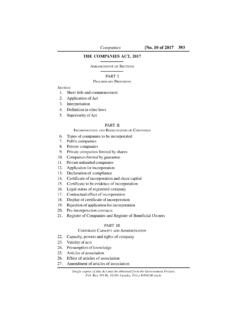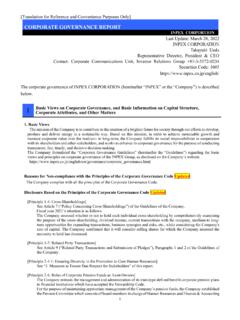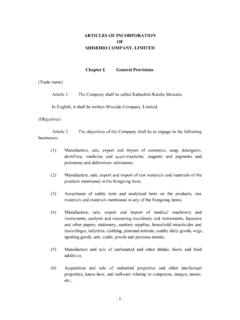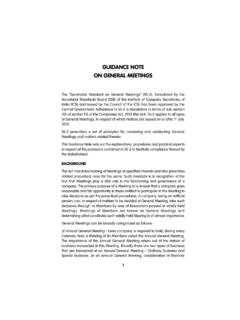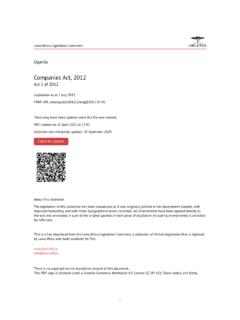Transcription of Mexican Corporations - Law Mexico
1 Mexican Corporations Types of Corporations The General Mercantile Corporations Law regulates all business Corporations established in Mexico . The most common forms of Corporations are the following: 1. Sociedad Anonima (S. A.) and Sociedad Anonima De Capital Variable (S. A. De C. v.) are negotiable stock Corporations of two or more persons whose liabilities for acts of the corporation are limited to their capital contribution. 2. Sociedad De Responsabilidad Limitada (S. De R. L.) and the Sociedad De Responsabilidad Limitada De Capital Variable (S. De De ) are nonnegotiable stock limited liability Corporations of two or more persons whose liabilities for acts of the corporation are limited to their capital contribution.
2 The abbreviation " " or "S. De De " after the name of the company merely indicates that the company is incorporated under this corporate form in the way "inc:' is used in the United States. The addition of "De " indicates that the corporation has variable capital, which simply means that the corporation may increase or decrease its capital stock within the limits established by the corporation 's by-laws, without having to formally amend its corporate charter. Most Corporations , regardless of their form, will opt for variable capital because of this added flexibility. The majority of businesses set up in Mexico are Sociedad Anonima De Capital Variable. When only a few parties are involved in the business, the Sociedad De Responsabilidad Limitada can be a good alternative, especially in the case of joint venture companies; nevertheless, the De still seems to be the most common choice when setting up a corporation in Mexico .
3 Corporate requirements The and the S. De Corporations , regardless of whether they have variable capital, must fulfill the following requirements: 1. The must have a minimum of two stockholders and its minimum capital stock cannot be less than N$50,000 pesos. In the case of the S. De , a minimum of two stockholders and a capital stock of N$3,000 pesos is required. 2. The corporation may be managed by a Board of Directors or a sole administrator. 3. The capital stock of the must be represented by nominative shares. The S. De does not have negotiable shares. 4. The general stockholders' meeting is the governing body of the Corporations and ratifies the transactions and operations made by the Board of Directors or the sole administrator.
4 Its resolutions are executed by either the sole administrator or the Board of Directors. 5. The general shareholders ' meeting for the can be ordinary or extraordinary; both are normally held at the corporation 's principal domicile. 6. The corporation must have an ordinary stockholders' meeting every year to approve the company's annual financial statements and annual report. This working article is hosted by Law Mexico Publishing and may not be commercially reproduced without the permission of the 1. copyright holder. Copyright 2009 Dennis John Peyton. 7. In extraordinary meetings the agenda must deal with certain unusual matters which, for the most part, may affect or change the basic principles upon which the company was founded.
5 Corporate management The management of the and the S. De is essentially the same, although the S. De may be simplified by eliminating the shareholders ' auditor. The basic hierarchy is as follows: shareholders ' meeting Directors or Sole Administrator shareholders ' Auditor Managers The shareholders have total control over the activities and policies of the corporation through shareholders ' meetings. Resolutions of shareholders ' meetings are binding and dictate the duties and activities of the directors or the sole administrator. The directors or the sole administrator act as officers of the corporation : the officers are obligated to carry out the resolutions adopted by the shareholders ' meetings and are generally responsible for the management of the company.
6 The shareholders ' auditors are supposed to oversee the activities of the directors or the sole administrator and report back to the shareholders ' meeting . In this way the power of the directors or the sole administrator is checked on an ongoing basis in order to protect the interests of the shareholders . shareholders ' meetings for Corporations Corporations have two types of shareholders ' meetings: ordinary and extraordinary. The determination of which shareholders ' meeting the company should summon can be very important, especially when quorum and voting majorities may determine the outcome of such meetings. The easiest way to decide which meeting should be called is to compare the agenda of the proposed meeting to the list reserved for extraordinary meetings below.
7 If the issues on the agenda are any of those in the list, the meeting must be an extraordinary meeting . Resolving such issues by an ordinary meeting would be invalid due to lack of quorum and proper notification procedures. An annual ordinary shareholders ' meeting must be held at least once a year within four months following the close of the fiscal year. Currently in Mexico , by law all Corporations have the calendar year as their fiscal year. Calling other ordinary meetings during the year does not preclude having to call the annual ordinary meeting during the first trimester after the fiscal year. Such annual meetings must: 1. Discuss, approve, or modify the directors' annual report, taking into account the shareholders '.
8 Auditor's report, and take whatever steps it may deem suitable. 2. Appoint the Director or Board of Directors and Stockholders' auditors in the respective cases as needed. 3. Set the remuneration payable to the Directors and the Stockholders' auditors when such remuneration is not fixed by the by-laws. This working article is hosted by Law Mexico Publishing and may not be commercially reproduced without the permission of the 2. copyright holder. Copyright 2009 Dennis John Peyton. The following issues are reserved exclusively for extraordinary shareholders ' meetings: 1. Extension of the duration of the company;. 2. Premature dissolution of the company;. 3. Increase or reduction of the capital of the company.
9 4. Changes in the objects of the company;. 5. Change of nationality of the company;. 6. Transformation of the company;. 7. Merger with another company;. 8. Issue of privileged stock;. 9. Redemption by the company of its own stock and issue of benefit shares;. 10. Issue of bonds;. 11. Any other modifications to the deed of incorporation;. 12. Such other matters as require a special quorum under the law or the articles of incorporation. Quorum for shareholders meetings ordinary meetings require a quorum of 50 percent of the outstanding capital stock for the first summons. If a quorum is not met, a second summons may be given and the meeting may legally proceed regardless of the number of shares represented at the meeting .
10 In both cases resolutions are passed by majority vote. Extraordinary shareholders ' meetings require a quorum of 75 percent of the outstanding capital stock for the first summons, unless the articles of incorporation require a higher percentage. Unlike the percentage for quorum in ordinary meetings, which cannot be increased, given the importance of the issues voted on in an extraordinary meeting , it is possible to increase the quorum to 100 percent of the shareholders . It is important to point out that such provisions must be included in the articles of incorporation, or must have been adopted by a prior meeting as an amendment to the articles in order for the increased quorum to be valid.
